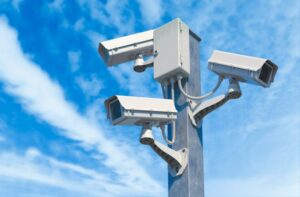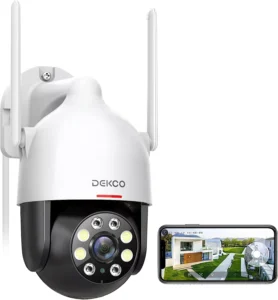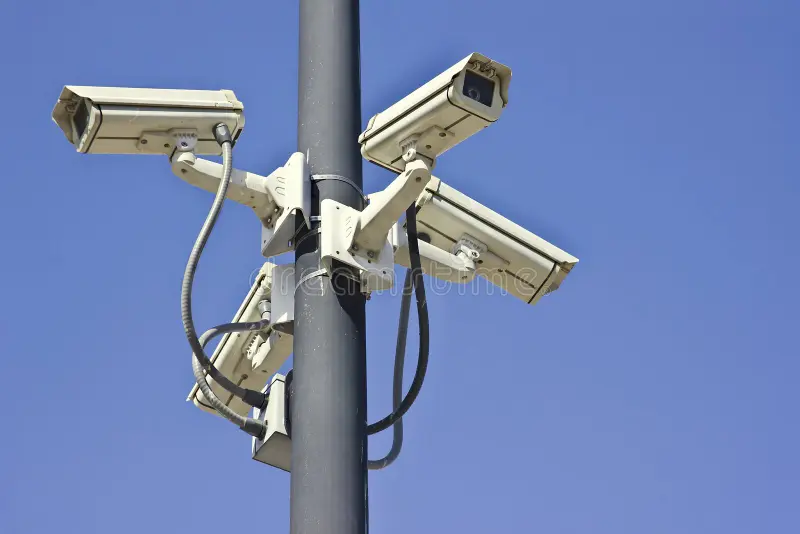With the rate of crime steadily increasing all over the world, there is little wonder that security is becoming a major concern for people everywhere. Burgeoning crime victimizes people and destroys their peace of mind. Installing security cameras at different strategic locations in your facility could be an effective way of keeping a close watch on the people and the goings-on there. Whether it is your home or your office that you want to secure, security cameras could be your best allies in this cause.
When choosing security cameras, you might get confused between the two main types – wired and wireless cameras. What are the major differences between the two, and which ones should you pay more attention to?
With this post we aim to answer these basic questions. Once you understand the fundamental differences, you should be able to pick the type of security camera that suits your needs the best.
Installation Process of Wired and Wireless Security Cameras
Wired Security Cameras
- Plan camera placement and run cables accordingly.
- Mount the camera and connect it to the power source.
- Connect the camera to the DVR or NVR via a cable.
- Configure the camera settings through the DVR or NVR.
Wireless Security Cameras:
- Determine the best camera placement and ensure a strong Wi-Fi signal.
- Power on the camera and connect it to the Wi-Fi network.
- Configure the camera settings through the mobile app or software.
- Repeat the process for additional cameras if necessary.
Performance and Reliability of Wired and Wireless Security Cameras
Wired Security Cameras
- Performance: Wired cameras offer high-quality video and audio with no signal interference or loss. They can handle large amounts of data, making them ideal for businesses and larger properties.
- Reliability: Since wired cameras don’t rely on Wi-Fi, they’re less prone to interference or signal loss. They’re also less vulnerable to hacking or cyber attacks.
Wireless Security Cameras:
- Performance: Wireless cameras offer good-quality video and audio, but may experience signal loss or interference due to distance or obstructions. They’re best suited for smaller spaces or homes.
- Reliability: Wireless cameras rely on Wi-Fi, making them more vulnerable to interference, hacking, or cyber attacks. They may also experience connectivity issues if the Wi-Fi signal is weak or unreliable.
Wired Security Camera Systems

Use sensors placed on doors and windows that are each wired individually to the main panel of the alarm. When these systems are installed correctly, the wiring is hidden in walls, baseboards and under carpeting for an added level of security and discretion. Over time, as needed, it is also easy to wire surveillance cameras, keypads, motion detectors and other security measures into an existing system should the homeowner wish to enhance security camera later.
Wired Camera Systems Pros
- The signal is not affected by nearby devices like baby CCTV monitors that can trigger false alarms
- Have the ability to incorporate more sensors than wireless camera systems
- Do not require battery changes, as the system is wired directly into the home’s electricity source
- Have a tried and true reliability, as they have been around for far longer than wireless camera systems
- Many systems sound an alarm whenever a wire is cut, which can alert homeowners or authorities to a potential home invasion
- Do not have the problem posed by wireless systems when sensors are located too far away from the alarm base for the signal to reach and communicate
- Most systems require installation by a technician, which reduces the chance that wiring will be completed correctly
- Harder to disable than wireless systems because the keypad, siren and control panel are typically installed in different locations throughout the house
- Cannot be wirelessly hacked
- Better for privacy concerns
- Preserves bandwidth with extended hard-drive storage
Wired Camera Systems Cons
- Are more difficult to install, as they require making holes in walls and floorboards to wire and connect the main alarm panel with the sensors
- Must be professionally re-installed whenever the homeowner moves
Wires can become corroded over time - Running wires through your home/business can be difficult (Wires through attic and small spaces)
- Post-installation home repairs often necessary
- Not mobile (Permanent install)
- Cameras and system cannot be easily moved
- DVR input jacks limit the number of cameras that can be added
- Difficult set-up
- Often invasive installation
Wireless Security Camera Systems

While wired systems rely on cords and sensors, wireless security camera systems send signals from door and window sensors to the main alarm panel using a wireless transmitter. With lower installation costs, less required maintenance, and keypads that can easily be integrated with thermostats, locks and lighting for whole-home automation, wireless security camera systems are a popular choice for many technologically savvy homeowners.
Wireless Camera Systems Pros
- Very easy to install without the help of a professional technician and require minimal, if any, wiring or drilling into the home
- Can be relocated when the homeowner moves simply by bringing the equipment along and re-installing it in the new home
- As sensors and batteries can easily be replaced, wireless security camera systems can have longer life spans than wired systems
- Are generally less expensive than wired systems when installation, equipment and monitoring costs are all taken into consideration
- Easy to upgrade features and equipment when new technologies emerge, as all connections are made through wireless security camera systems transmissions and do not require new hardwiring
- Use replaceable batteries instead of electricity and therefore will continue to work even when the power is out
- Easy to prevent signal interference when all equipment that produces a wireless security camera systems signal is strategically placed in the home
- Are very reliable, as the main confounding variable is the batteries that power the devices
- Many systems can be connected to mobile devices for remote monitoring capabilities, which can include the ability to control all home automation variables from afar
Wireless Camera Systems Cons
- Easier to disable than a hardwired system because equipment is not wired-in in different locations
- Can pick up interfering signals from other wireless devices that can trigger false alarms
- Whichever you prefer, wired and wireless security systems can provide a sense of safety, security and peace of mind in the home.
- Less reliable (Dependent on WIFI)
- More configuration required (Manually adding IP addresses)
- Risk of security (More vulnerable on the network)
- Dependent on the Wi-Fi connection
- Must be individually plugged in to nearby outlets
- Signal can be intercepted
- Possible Wi-Fi interference from other Wi-Fi-equipped devices
- Walls may hamper Wi-Fi signal
Cost and Installation
Wired Camera Systems
Wired security cameras cost less compared to their wireless counterparts, but are also known to require a more elaborate and complex installation process.
Wireless Camera Systems
Wireless cameras, on the other hand, may cost more but are relatively simpler to install as they do not come with multiple wires and cables. They cost more, but the prices of these cameras have been going down steadily.
Power Supply
Wired Camera Systems
Wired cameras are powered by electricity and hence need to be fixed near an electrical source for a continuous power supply.
Wireless Camera Systems
Wireless cameras operate on batteries and do not require an electrical power source. Do note that the batteries may have to be replaced several times a year to enable the camera to function optimally and constantly.
Concerns
Wired Camera Systems
The exposed wires may be susceptible to meddling and damage by mischief-mongers. Apart from that they may also fall prey to the elements and become defunct over time if located outdoors.
Burglars may also fiddle with the exposed wires and disconnect/cut them off, defeating the purpose of having a security camera.
Wireless Camera Systems
Wireless security cameras are susceptible to signal loss or interferences due to extreme weather conditions, and interference from other operational electronic appliances like computers, TV, cellphones, etc.
Once the signal is lost/disturbed, the camera can pass the feed on to the wrong device, or simply stop functioning. Such issues render it useless.
Several wireless security cameras do need to be connected to a power source to function. So despite having wireless transmitters, they still aren’t exactly wireless. This can, however, be overcome by using an adapter that allows the camera to run on batteries. Newer models come equipped with this feature.
Unless fool-proof measures are taken, Internet-enabled cameras are prone to getting hacked or remotely compromised, which can enable other people to control your cameras and invade your privacy.
With the basic differences between the wired and wireless cameras out of the way, here are a few types of cameras you can consider for personal or business use.
Which One is Best for Your Home or Business: Wired or Wireless Security Cameras?
Choosing between wired and wireless security cameras largely depends on the specific needs of your home or business. Here are some factors to consider:
Wired Security Cameras:
- Best for businesses or larger properties that require high-quality video and audio.
- Ideal for areas with reliable power sources and the ability to run cables for installation.
- Recommended for locations where security is a top priority and cyber attacks or hacking are a concern.
Wireless Security Cameras:
- Best for residential use or smaller businesses with limited space or budget.
- Ideal for areas with limited or no access to power sources or for those who prefer a quick and easy installation process.
- Recommended for locations where security is a concern but not the primary focus.
Ultimately, the best choice between wired and wireless security cameras depends on your specific needs and priorities. If high-quality video and audio are essential, wired cameras may be the better option. If convenience and ease of installation are a priority, wireless cameras may be the way to go. A security professional can help assess your needs and recommend the best solution for your home or business.
Which Do I Choose? Wired or Wireless?
Before you decide which kind of camera you choose, identifying a few main key points will probably influence your decision. Are you looking for something easy to install? Are you looking for something extremely reliable? These key points will ultimately determine which camera you would use. Wired cameras offer supreme reliability and ease of installation with their plug and play installation. Wireless offers extremely simple installation with slight configuration but ends up being completely reliant on a wireless connection so if it ever fails, then your cameras will go down.
A1’s Recommendation
To be up front and honest, both wired and wireless camera systems are going to be great options and we utilize both depending on specific customer needs and situations. If you are looking for a reliable security camera system with minimal downtime and minimal maintenance, we would recommend using a hard-wired IP system. If you are looking for a simple and mobile solution, for example, a house or apartment that you won’t plan on staying in for very long, wireless would be ideal for you. We once had a customer who was a real estate agent and was getting ready to sell multiple locations at once. What he needed was a simple security camera system that could be moved in just a couple months down the road. What we did was recommend a wireless system for each property, allowing him the freedom to uninstall his cameras and move them once his tenant moved in. At the end of the day, it is going to come down to your specific situation. If you don’t feel comfortable choosing which would be best for you, contact one of our sales experts and we can find the right system for you.
Contact information: info@Eagleeyesecuritysystem.com — Phone: 923017-682-2005

